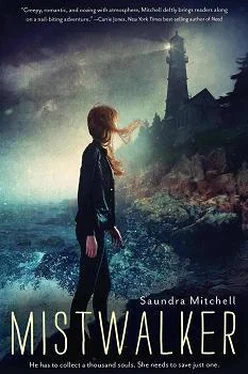Calm and certain, Dad’s Girlfriend told me that I had a couple of hours before the fog lifted yet. That I should exercise extreme caution. That if I had no official business, I should stay home. That’s when I closed the door and headed into the haze.
I faltered on the step and hesitated. I really couldn’t see anything. People talked about fog so thick you couldn’t see your hand in front of your face. It was true; I touched my nose, then reached for the stair rail. My hand disappeared.
Nothing had shadows or depth, and I tripped again on a front walk I’d been running down my whole life. Instead of going back, I closed my eyes. There wasn’t much to Broken Tooth. I pictured it in my head—the steps in front of me, the broken piece of sidewalk two steps from the mailbox.
With a deep breath, I took a surer step. Then another, and then I opened my eyes and kept going. My phone trilled in my pocket, and I pulled it out. Another text from Bailey, wanting to know what was going on. I had a couple more, one in all caps. DID YOU DUMP SETH!?
I wasn’t answering. Not that one, not any of them. There was an ad on Craigslist for a used thirty-five-foot Brewer in Milbridge, and that’s all that was on my mind. It was a junk heap of a boat from the pictures, the hull weathered and grey.
Since it was on a trailer instead of in the water, I wondered what was wrong with it. The listing admitted a blown head gasket; there was probably plenty more. It already had a name in chipped orange paint: Nevermind. Not my style, but it didn’t matter. It was cheap.
The mortgage wasn’t my problem anymore, so I had money to spend. I just had to hitch a ride up that way to get a look at it. And that meant I needed to walk out to the highway, through the fog. Past it. The ground was solid, and it wasn’t that far. A couple of blocks to the main drag, and that would take me straight to Route 1.
But my feet weren’t as sure as I thought they were. I tottered on the edge of the curb before I realized I’d veered off the sidewalk. Just then, I heard the clear call of a harbor bell. Frowning, I stopped and turned. Water whispered in the mist, lapping at the shore, at the sides of our moored boats.
I’d turned the wrong way completely. Instead of walking landward, I’d found the sea. Stretching my hands out, I felt for the familiar wood rail at the wharf. I slid my feet instead of raising them.
Tension wound around me, tight like rope. I couldn’t have gone far, but I was lost all the same. It was hard to take a breath, and the cool burned off my skin in a panicked second.
It was just fog. All I had to do was sit down and wait. Maybe minutes. Maybe an hour or two. But it would lift. The fog always did—no matter how solid it seemed, it was just vapor. A ghost on the water, a cloud too low. It would fade.
I knew that. But my heart still pounded. The world had no shape; I had no idea where I was. There could have been something else in the white. Someone else. Some danger, some evil standing right behind me, waiting. Pulling my sleeves over my hands, I held my breath. I listened.
Another harbor bell sounded, its call twisted. It echoed above me instead of spreading across the water. When I realized I couldn’t trust my ears, I sat down hard. I’d known better, and I was just like the sailors that went fog blind. Lost their instruments, couldn’t trust their eyes, so they sailed by the way they felt.
Sometimes they got lucky, saw a gull or a lighthouse beacon and followed it to land. But there were plenty that turned into open seas and never came home.
An electric wave passed above me. Leaning my head back, I stared into nothing, indistinguishable from the white all around me. Then it passed again, a beam illuminating the sky. The light bounced, glimmering in strange patterns. It didn’t cut through the fog; it shaped it.
Standing, I waited for the beam to pass again. When it did, I turned that way and settled. That way lay Jackson’s Rock. The ocean was in front of me. The village behind me. It wouldn’t take me home, but I felt less alone. There was someone in the lighthouse, reaching to me through the bright.
I swear, I heard the light passing. And this time, it did cut the mist. The fog peeled apart, a narrow strip leading straight to the shore. Water stretched like asphalt into the distance. Hazy tendrils swirled across it, parted by a prow.
A dory had slipped its tether. It drifted against the rocks, bumping quietly as the waves tried to carry it in.
Behind me and beside me, the fog was still thick. It parted just to the water, just to the boat. If it was mine, I would have wanted somebody to catch it, so I started down the incline. I could sit on rocks as easy as I could the sidewalk, holding rope instead of my own knees. When the air cleared, I could sail it back to the wharf and leave it tied there.
I grabbed the bow, my boots splashing in the surf. I’d never seen a dory so pristine. It was white on the outside, unchipped and smooth. The inside was honey gold, wood polished to a gleam. There was a brass and brown compass set into the floor, and no rope anywhere.
The dory was heavy, too, pulling like it wanted to glide onto the water again.
Struggling against it, I backed toward shore. In turn, it pulled toward Jackson’s Rock, harder than the tide would take it. Cold water splashed up my jeans. It chilled my hands, and I let go.
There was gonna be an ID number painted on the stern, or a name—probably both. Since I wasn’t about to drown myself in the fog, I’d just spread the word.
But the dory didn’t wash away. It spun lazily in the water, deliberate, like it was orienting itself. I’d never seen anything like it. It was unnatural, just like the perfect alley that split the mist.
Before I could reason it out, the dory finished its turn. I didn’t have to squint to make out the name on the stern. It was a tattoo, icy ink that pricked my skin.
Willa
Humming now, the lighthouse swung its beacon around again. The light sizzled on my skin, crackled in my ears. And the boat waited. It sat on the water like it was anchored, waves lapping around it.
My breath fell heavy as I peered into the distance. He was there again, the figure on Jackson’s Rock. It was too far away to make out a face, but I swore I saw one anyway. Dark eyes turned toward mine. Thin lips pressed together tight.
I had finally lost it. That was the only explanation. I’d gone away in my head to escape the real world. To forget the things I’d done. That’s why I caught the stern of the boat and stepped into it. It’s why I didn’t bail when it started to move, steered toward Jackson’s Rock unerringly.
Since it wasn’t real, I wasn’t afraid.
I landed on the far side of the Rock. My head ached, a distant pain that was easy to ignore. My bones knew I didn’t belong there, but the boat disagreed. It ground against the shore and stopped. It was strange how alive it felt, like it was vibrating. Urging me to get out.
As soon as I put both feet on land, the dory melted into the fog. I turned in time to see the path from island to shore fill. Hazy curtains closed behind me. If there was a mainland, a sea between this land and that, I couldn’t tell. The mist swirled on itself. It parted only for the island, opening up with the slope of the shore.
Pale light filtered through the trees. It wasn’t warmer or colder there, but I shivered anyway. Earth and water and the astringent sweetness of fir filled my nose. The light swung overhead again, heavy and real.
Shoving my hands into my hoodie pocket, I hiked toward an opening among the pines. The lighthouse was on the other side. It didn’t seem like a big island from the water. On foot, it stretched on forever.
Читать дальше












